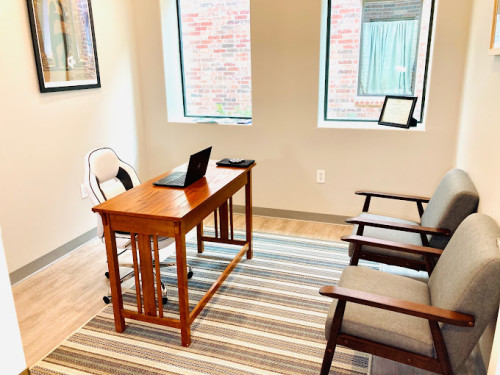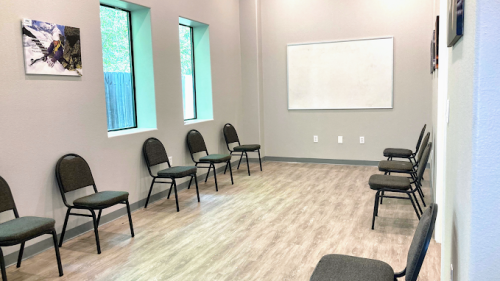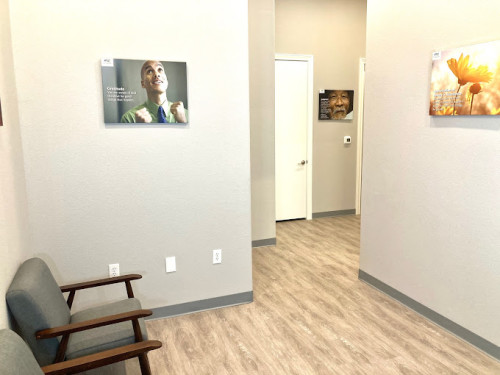





Positive Recovery Center The Woodlands
Treatment Focus
This center treats substance use disorders and co-occurring mental health conditions. Your treatment plan addresses each condition at once with personalized, compassionate care for comprehensive healing.
Primary Level of Care
Outpatient treatment offers flexible therapeutic and medical care without the need to stay overnight in a hospital or inpatient facility. Some centers offer intensive outpatient program (IOP), which falls between inpatient care and traditional outpatient service.
Claimed
Recovery.com has connected directly with this treatment provider to validate the information in their profile.
Treatment Focus
This center treats substance use disorders and co-occurring mental health conditions. Your treatment plan addresses each condition at once with personalized, compassionate care for comprehensive healing.
Primary Level of Care
Outpatient treatment offers flexible therapeutic and medical care without the need to stay overnight in a hospital or inpatient facility. Some centers offer intensive outpatient program (IOP), which falls between inpatient care and traditional outpatient service.
Provider's Policy
Currently, Positive Recovery Centers is a preferred provider with Cigna, Aetna, Ambetter, Superior Health, Blue Cross Blue Shield of Texas, UBH / Optum / Oscar (United Healthcare), Community Health Choice, Humana, Magellan, and others.
Positive Recovery Center The Woodlands
Positive Recovery Center The Woodlands
About Positive Recovery Center The Woodlands
Positive Recovery Centers provides comprehensive, personally tailored treatment for adults with addiction and co-occurring disorders throughout several locations in the greater Houston, Hill Country, and Dallas/Fort Worth areas. Their Woodlands location offers a range of outpatient services with a partial hospitalization program (PHP), intensive outpatient program (IOP), supportive outpatient program (SOP), as well as intensive outpatient virtual therapy services.
Their continuum of care is designed to gradually increase personal responsibility while steadily decreasing the need for intensive and structured care while offering ongoing support to clients and their families.
Comprehensive Outpatient Care
The partial hospitalization program (PHP) at Positive Recovery offers their highest level of outpatient structure and accountability. PHP often bridges the gap when transitioning from residential to outpatient care, providing clients with a more intensive treatment program while allowing the flexibility to live at home or in a sober living setting. Their PHP program is an ideal fit for individuals who are stepping down from residential treatment, or for those seeking sobriety who do not require 24/7 monitoring and stabilization.
Clients in PHP attend a minimum of 20 hours of structured treatment per week in addition to meeting weekly with a physician who may provide medication management services when necessary. The programming at Positive Recovery is deeply immersed in the scientifically proven ‘positive recovery’ curriculum blended with other evidence-based methods. In addition, recreational and experiential activities such as music and art appreciation may be offered to encourage self-discovery and emotional release and growth.
While similar to PHP, their IOP is best suited for individuals who are ready to return to work, school, or other responsibilities. IOP fully engages clients in treatment while offering flexibility with day time, evening, and virtual options. Clients typically attend 9-12 hours of treatment 3-4 days per week over 8 weeks in total with a focus on topics such as developing coping and life skills, managing symptoms, relapse prevention, and developing an outside support system.
Supportive outpatient programming (SOP) provides individual counseling on an outpatient basis while navigating early recovery, often after completion of PHP or IOP. Clients can continue their recovery journeys in a safe, supportive, and structured environment that reinforces positive behaviors and promotes further healing and growth.
Family Involvement and Aftercare
Positive Recovery’s robust treatment incorporates family involvement and supportive aftercare services. Family workshops address the needs of all family members, encouraging positive behavioral changes and open, honest communication. Clients and family members attend educational lectures, group therapy, and experiential activities that foster understanding and growth.
Clients enrolled in aftercare services participate in weekly group support meetings led by licensed counselors. Aftercare support can reduce risk of relapse, reinforce coping strategies, improve social skills and communication, and encourage healthy lifestyle choices. Depending on individual needs, aftercare may last several weeks, months, or years, and may also incorporate community recovery groups such as 12-step recovery. Positive Recovery also offers monthly progress reports to employers or licensing boards when required.
Center Overview
Treatment Focus
This center treats substance use disorders and co-occurring mental health conditions. Your treatment plan addresses each condition at once with personalized, compassionate care for comprehensive healing.
Joint Commission Accredited
The Joint Commission accreditation is a voluntary, objective process that evaluates and accredits healthcare organizations (like treatment centers) based on performance standards designed to improve quality and safety for patients. To be accredited means the treatment center has been found to meet the Commission's standards for quality and safety in patient care.
Insurance Accepted
Cash Pay Rates
Estimated Cash Pay Rate
Center pricing can vary based on program and length of stay. Contact the center for more information. Recovery.com strives for price transparency so you can make an informed decision.
Levels of Care








Your Care Options
Specializations
Day Treatment
In a PHP, patients live at home but follow an intensive schedule of treatment. Most programs require you to be on-site for about 40 hours per week.
Intensive Outpatient Program
In an IOP, patients live at home or a sober living, but attend treatment typically 9-15 hours a week. Most programs include talk therapy, support groups, and other methods.
Who We Treat
Men and Women
Men and women attend treatment for addiction in a co-ed setting, going to therapy groups together to share experiences, struggles, and successes.
Approaches
Twelve Step
Incorporating spirituality, community, and responsibility, 12-Step philosophies prioritize the guidance of a Higher Power and a continuation of 12-Step practices.
Experiential
Expressive tools and therapies help patients process past situations, learn more about themselves, and find healing through action.
Evidence-Based
A combination of scientifically rooted therapies and treatments make up evidence-based care, defined by their measured and proven results.
Family Involvement
Providers involve family in the treatment of their loved one through family therapy, visits, or both–because addiction is a family disease.
Strengths-Based
Providers using a strengths-based philosophy focus on the positive traits of their patients, creating a positive feedback loop that grows confidence.
Individual Treatment
Individual care meets the needs of each patient, using personalized treatment to provide them the most relevant care and greatest chance of success.
Therapies
1-on-1 Counseling
Patient and therapist meet 1-on-1 to work through difficult emotions and behavioral challenges in a personal, private setting.
Family Therapy
Family therapy addresses group dynamics within a family system, with a focus on improving communication and interrupting unhealthy relationship patterns.
Twelve Step Facilitation
12-Step groups offer a framework for addiction recovery. Members commit to a higher power, recognize their issues, and support each other in the healing process.
Psychoeducation
This method combines treatment with education, teaching patients about different paths toward recovery. This empowers them to make more effective decisions.
Motivational Interviewing and Enhancement Therapy (MET)
This approach is based on idea that motivation to change comes from within. Providers use a conversational framework that may help you commit to recovery.
Art Therapy
Visual art invites patients to examine the emotions within their work, focusing on the process of creativity and its gentle therapeutic power.
Meditation & Mindfulness
A practiced state of mind that brings patients to the present. It allows them to become fully aware of themselves, their feelings, and the present moment.
Life Skills
Teaching life skills like cooking, cleaning, clear communication, and even basic math provides a strong foundation for continued recovery.
Substances We Treat
Cocaine
Cocaine is a stimulant with euphoric effects. Agitation, muscle ticks, psychosis, and heart issues are common symptoms of cocaine abuse.
Prescription Drugs
It's possible to abuse any drug, even prescribed ones. If you crave a medication, or regularly take it more than directed, you may have an addiction.
Co-Occurring Disorders
A person with multiple mental health diagnoses, such as addiction and depression, has co-occurring disorders also called dual diagnosis.
Drug Addiction
Drug addiction is the excessive and repetitive use of substances, despite harmful consequences to a person's life, health, and relationships.
Heroin
Heroin is a highly addictive and illegal opioid. It can cause insomnia, collapsed veins, heart issues, and additional mental health issues.
Synthetic Drugs
Synthetic drugs are made in a lab, unlike plant-based drugs like mushrooms. Most synthetic drugs are either stimulants or synthetic cannabinoids.
Methamphetamine
Methamphetamine, or meth, increases energy, agitation, and paranoia. Long-term use can result in severe physical and mental health issues.
Opioids
Opioids produce pain-relief and euphoria, which can lead to addiction. This class of drugs includes prescribed medication and the illegal drug heroin.
Alcohol
Using alcohol as a coping mechanism, or drinking excessively throughout the week, signals an alcohol use disorder.
Languages
Aftercare
Care Designed for Your Needs
Amenities
Special Considerations
Activities
Yoga
Yoga is both a physical and spiritual practice. It includes a flow of movement, breathing techniques, and meditation.





